The Debt Relief Program Restoring Voting Rights for People with Felony Convictions
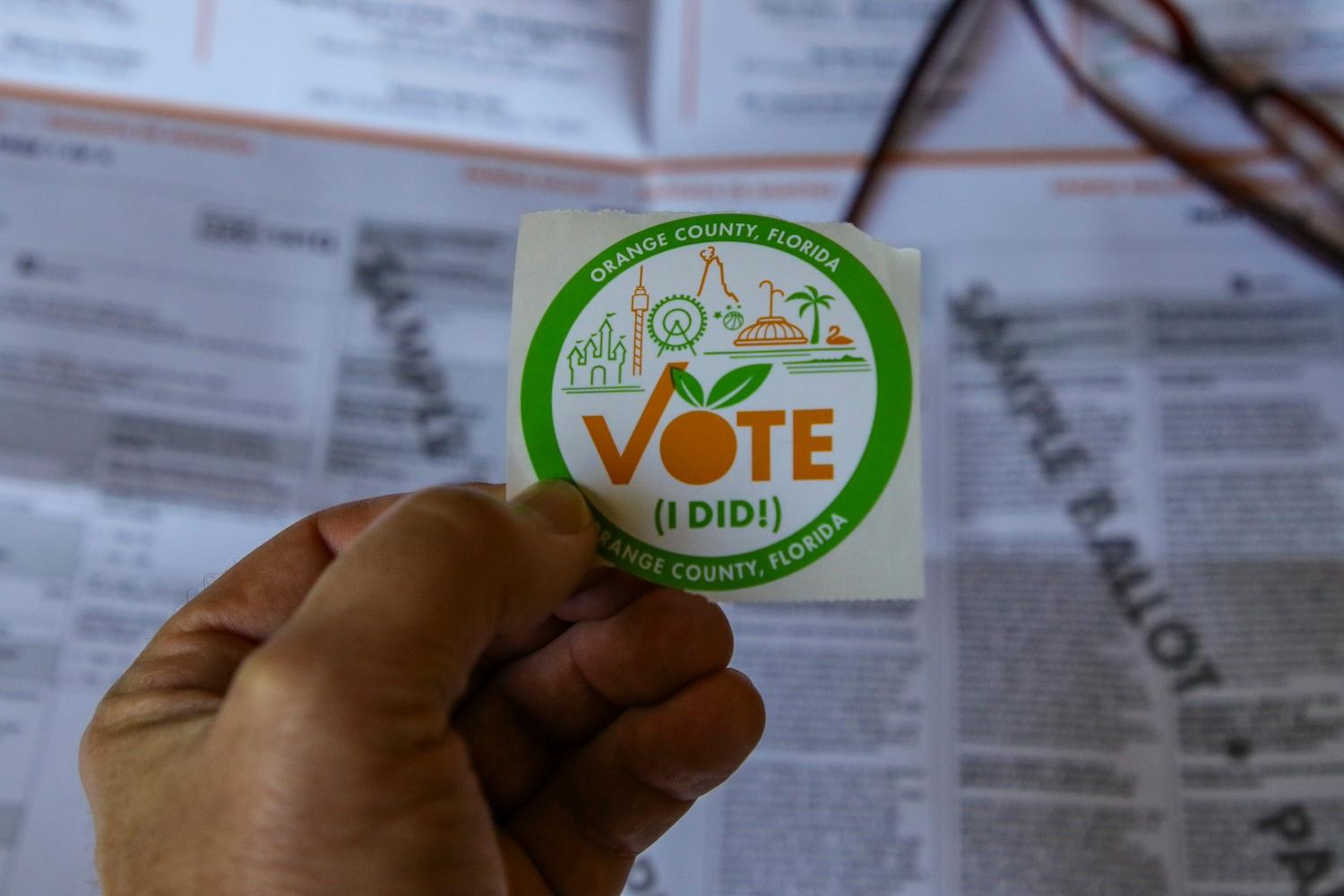
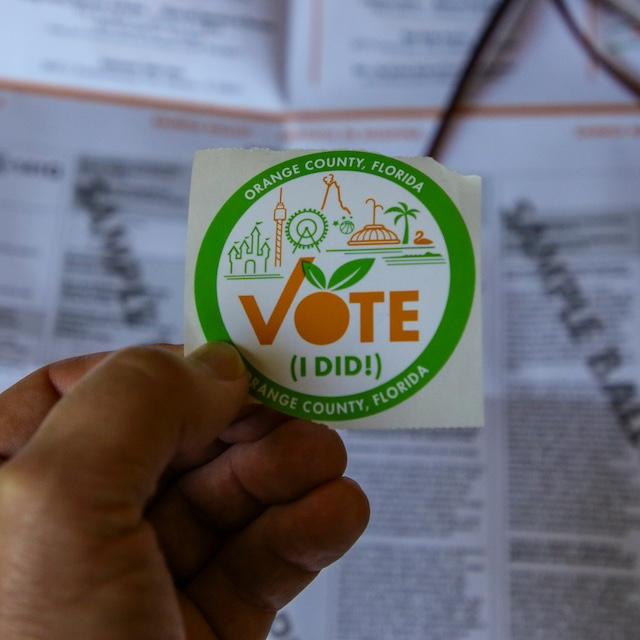
(Image: Mick Haupt/Unsplash)
The United States accounts for about 4 percent of the global population but houses around 20 percent of the world’s prison population. Forty-eight states have laws banning people with felony convictions from voting. As a consequence, more than 4 million Americans, roughly 2 percent of the voting-age population, remain ineligible to vote even after completing their prison terms. The nonprofit Free Our Vote is among the organizations working to change that.
“Our goal is to use [technology] and data to expand the franchise, to incorporate millions of returning citizens,” Alexander Billy, co-founder of Free Our Vote, told TriplePundit. “These folks that paid their debt to society, they don’t have a lot of faith in democratic institutions, and it’s our goal to create a voting system that is more inclusive and works for people.”
Free Our Vote was established in Florida during the aftermath of Amendment Four. Passed in 2018, it was intended to restore voting rights to Floridians with felony records, potentially giving nearly 1.7 million people the right to vote.
However, the phrase “terms of sentence” in the amendment, which attracted support from across the political spectrum, led to ambiguity regarding the inclusion of criminal assessments or legal financial obligations, such as outstanding debts and payments imposed by the court. The Republican-dominated Florida legislature passed a law requiring the payment of all fines, fees and restitution to qualify for reinstatement of voting rights. The move reduced the number of re-enfranchised individuals by approximately 1 million voters.
“We really thought that everyone with a past conviction would be able to vote once they completed the terms of their sentence,” Billy said.
In 2020, Free Our Vote implemented a debt relief program to cover the financial obligations that prevented people from reclaiming their voting rights. It led to a significant increase in voter turnout among previously disenfranchised voters in Florida.
Afterward, Free Our Vote compared electoral participation between registered voters whose financial obligations were eliminated by the nonprofit to debtors who did not benefit from the program. The debt relief program increased voter turnout by 26 percent among the people it served during the 2020 election.
States that tie re-enfranchisement to legal financial obligation often lack or don’t commit the resources to help people determine their voting rights, Billy said. After Amendment Four passed, election administrators in Florida were handling roughly 57 cases per day to determine who was eligible.
“Going through 57 cases per day when there are 1.7 million potential voters would've taken literally decades,” he said. “And as we learned later, even people who have decades of experience in the criminal legal system in Florida really could not make heads or tails of who was eligible.”
The arguments in favor of this system are misguided and the alleged benefits from revenue are overstated, according to research conducted by Billy and other members of the nonprofit. Failure to pay criminal court debt is often the result of bureaucratic complications and indigency, Billy said. Given the impact on indigent and Black defendants and the uncertainty it creates about voter eligibility, felony financial disenfranchisement is “a socially harmful policy that should be eliminated,” according to the research.
“Ordinary Americans are not in a position to comb through the data to determine eligibility. That is a huge challenge for them, just in terms of the administrative resources they would need to collect and understand the data,” Billy said. “But in the case of Florida, as in many other states throughout the country, it’s not just the difficulty in understanding complex law and data sources. It’s also having the financial wherewithal to be able to pay off fines and fees.”
The nonprofit recently received a boost as a part of the 2024 Fast Forward Startup Accelerator. Free Our Vote and 11 other nonprofits receive seed funding, training, mentorship and technical support through the program. Fast Forward is also leveraging its network of partners to offer skills-based mentoring from its employees, ensuring the nonprofits have access to the necessary resources and knowledge to scale effectively.
Participating in the Startup Accelerator has been “transformational” for Free Our Vote, Billy said. “Fast Forward has an incredible network of people in the development space,” he said. “We’re in contact on a regular basis with world-renowned funders who have missions that align with our own. I think there’s going to be a real opportunity to tap into some of that funding and really scale up.”
Since its founding, Free Our Vote expanded its efforts to pay off debts and restore voting rights in Georgia, Virginia, Kansas, Arizona and Washington. Plans are in motion to move into nine other states.
“We don’t want to see a voting system that plays this game of ‘gotcha,’” Billy said. “And we want ordinary Americans to really believe that the system works for them.”
Will the American Climate Corps Help Young People's Mental Health?
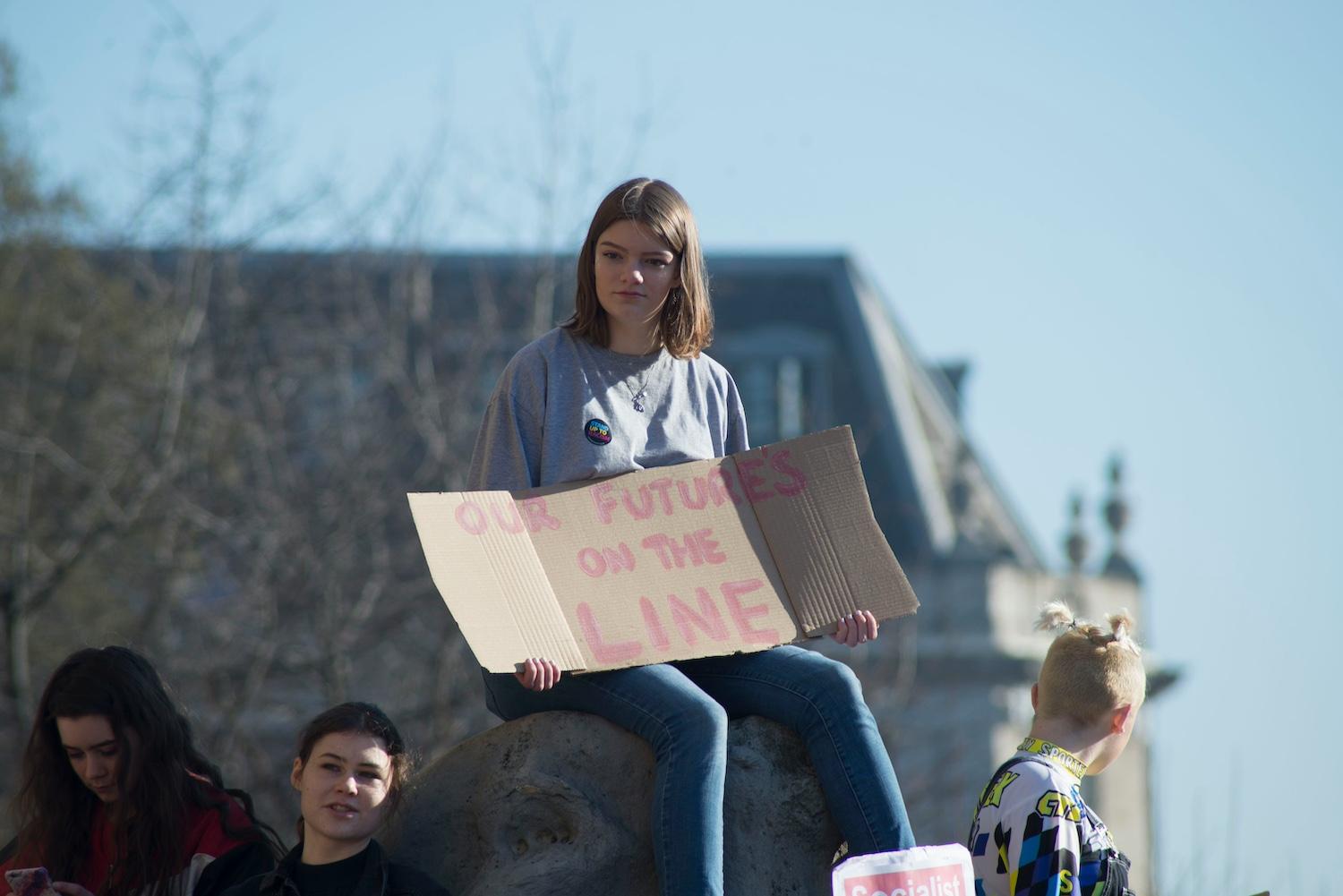
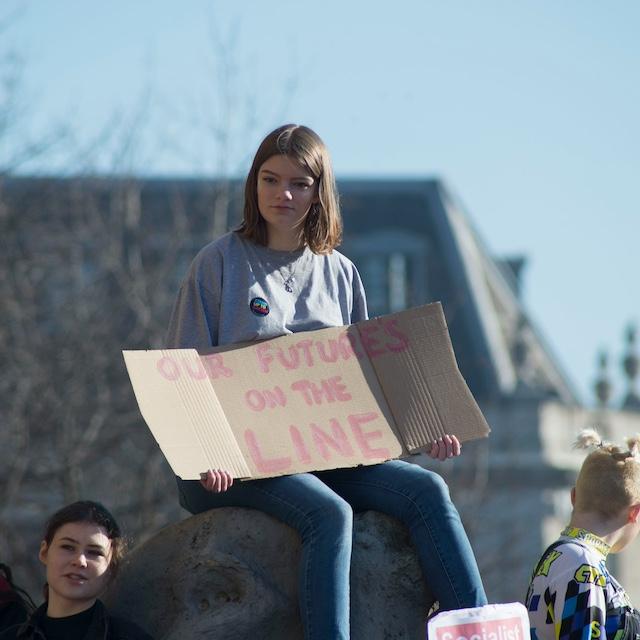
(Image: Josh Barwick/Unsplash)
This story was originally published by Grist. Sign up for Grist's weekly newsletter here.
In the depths of the Great Depression in 1933, President Franklin D. Roosevelt warned Congress that millions of Americans were idly “walking the streets,” presenting a threat to the country’s stability, even though they “would infinitely prefer to work.” It’s part of the reason he proposed the Civilian Conservation Corps, a program that would hire men to preserve forests, prevent soil erosion, and control floods. “More important, however, than the material gains will be the moral and spiritual value of such work,” Roosevelt said.
President Joe Biden referenced that line last month when he announced the launch of the American Climate Corps, a government jobs program inspired by Roosevelt’s that tackles the environmental problems of the 21st century. Besides the obvious benefits of restoring wetlands and installing solar panels, the climate corps is intended to pave a path to green careers for those who sign up. Another advantage of joining, though less-discussed, is that it could help alleviate widespread climate anxiety, channeling young people’s concern into concrete, hands-on work. More than half of Americans are anxious, to some degree, about how climate change is affecting their mental health. There are only about 250 job listings on the climate corps site right now, though some of those openings have multiple positions. The White House expects to employ 20,000 people over the program’s first year.
While the vast majority of 18- to 28-year-olds in the United States say they’re worried about climate change, two-thirds of them are unsure what they can do to make a difference, according to polling from the think tank Data for Progress in 2022. The combination is ripe for “climate anxiety,” a catch-all term for the feelings of grief, fear, and distress that’s not so much a clinical diagnosis as a logical response to living through the hottest period on Earth in 125,000 years.
According to common wisdom, the best way to treat existential dread about global warming is to “take action.” But not all types of climate action are equal. Proponents of the American Climate Corps suggest that the program offers something more substantial than ditching meat or taking a bike ride — it’s a chance to work on climate change or environmental justice issues all day as part of a larger cause. “There’s something about, ‘Here is a clear job with a clear timeline and a clear local goal. I can, like, put my hands in the dirt,’” said Kidus Girma, campaign director of the Sunrise Movement, a youth-led climate organization that fought to make the climate corps happen.
In small doses, anxiety can prompt people to do something, but in large doses, it can be incapacitating. The structure of the American Climate Corps could be useful for young people who are overwhelmed by the enormity of a global problem and aren’t sure where to start, said McKenna Parnes, a clinical psychology researcher at the University of Washington.
Taking action as part of a group, as opposed to going it alone, can significantly alleviate the distress associated with climate change, according to a study Parnes co-authored in 2022. Climate corps members wouldn’t necessarily need to be working with people all day to get those benefits. “Even if it’s folks that are doing individual jobs but part of the greater collective, just by nature of being part of the climate corps, there’s already that collective piece,” she said.
Jennifer Rasmussen, a registered nurse and an education fellow with the Planetary Health Alliance, a global network of organizations addressing the health effects of environmental changes, said that social support networks are key for improving mental health, especially with the rise of loneliness among young people. Being a member of the corps could also provide a sense of purpose and fulfillment, as well as help people build self-confidence by learning new skills — all of which tend to increase people’s psychological resilience and well-being, she said.
Roosevelt might have been ahead of his time when he wished the initial Civilian Conservation Corps members a “pleasant, wholesome, and constructively helpful stay in the woods.” Recent research suggests that feeling a connection to nature is associated with lower levels of depression and anxiety, another promising sign for American Climate Corps members who end up tending to forests, streams, or community gardens.
Climate anxiety comes in different forms: It can spring from a disaster, such as living through a flood, hurricane, or smoke-filled wildfire season. It can also take the shape of some existential dread about the future, even if you haven’t experienced a disaster yourself. A survey in 2021 found that climate anxiety was common in 10 countries across four continents, with 45 percent of young people saying that worrying about the environment was affecting their daily lives and ability to function.
That report suggested that this emotional distress stemmed from governments’ failure to respond to the problem. That rings true for Matt Ellis-Ramirez, a coordinator at Sunrise Movement Miami who recently graduated from the University of Miami and is thinking about joining the American Climate Corps. In Florida, for instance, a bill that removes most mentions of climate change from the state’s laws was signed by Governor Ron DeSantis on Wednesday, and last month, DeSantis signed legislation that bans local rules to protect outdoor workers from extreme heat.
“I think that’s where my anxiety comes from — that if we’re not actually able to shift our political system, that we might actually just be watching Miami become unlivable,” Ellis-Ramirez said.
Ellis-Ramirez is most excited about applying for hands-on positions in the American Climate Corps, like restoration efforts in the Everglades or planting trees in neighborhoods that lack them. Girma said that if he was looking for a job in the corps, he’d like to work on coastal restoration. “But I don’t think I would confidently say coastal restoration is the thing for people who have anxiety,” he said. “I think it’s broadly like, ‘Can I see a clear, measurable impact from my work day to day?’”
Saul Levin, the legislative and political director at the Green New Deal Network, says that there’s something empowering about knowing that people are working around you to address climate change and make communities safer. “It’s really not just the thousands and thousands of people who will be employed through the [American Climate Corps] who I think could have had their mental health improved, but also their acquaintances, families, neighbors, who similarly will benefit from knowing that folks are actually being hired to work on this.”
This story has been updated to reflect Governor DeSantis’ signing of a bill and the number of job openings available.
This article originally appeared in Grist. Grist is a nonprofit, independent media organization dedicated to telling stories of climate solutions and a just future. Learn more at Grist.org
A Just Transition Starts with Ensuring Immigrant Oil Workers Know Their Rights


(Image: Zbynek Burival/Unsplash)
“If we want change, we're going to have to change it,” Felix Rodriguez, a community organizer at Somos Un Pueblo Unido, told TriplePundit. It’s a statement that applies to many issues, but it’s especially true for immigrant rights in the workplace, where political power is negligible. “We basically have zero,” he said.
Rodriguez is the newest community organizer with Somos, an immigrant rights organization that’s strengthening its members’ resolve to demand better treatment and employment options during the transition to low-carbon energy. As a former oil and gas worker and a member of the local community, he’s well-versed in the barriers workers face in New Mexico’s Permian Basin, one of the top oil regions in the United States. He’s volunteered with Somos since he was in fifth grade.
Making immigrant voices heard starts with networking
There weren’t any Somos members in Artesia and Carlsbad, New Mexico, when Rodriguez began organizing in the area, so he had to network from scratch. His connection to the community no doubt made a difference in his ability to relate to people and connect to them through local institutions, such as churches.
“I give them homework: Bring one person so they can learn about their rights,” he said. “And they'll bring them, and that's how we started growing.”
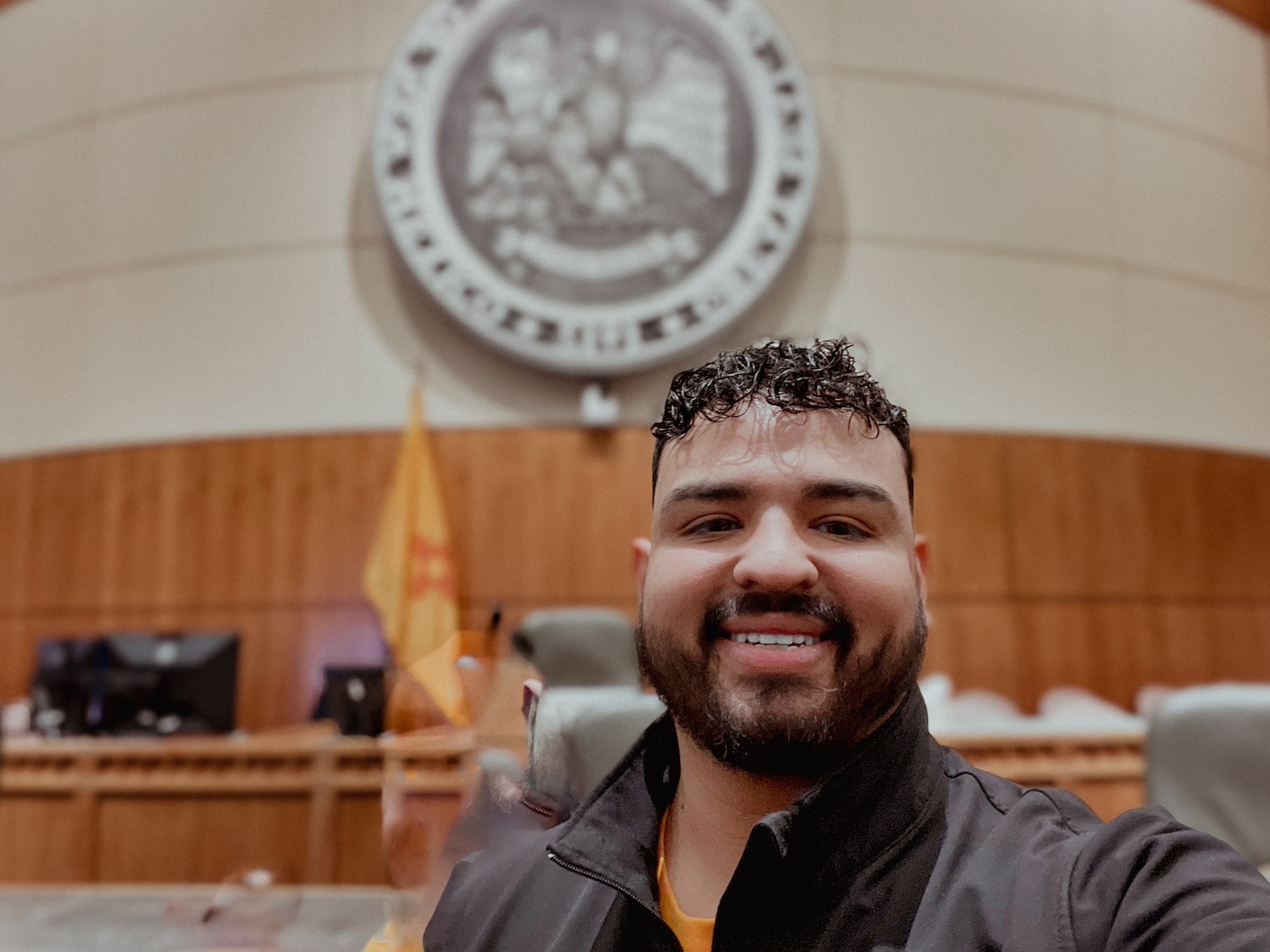
But organizing mixed-status workers comes with challenges. Undocumented immigrants are often, understandably, reluctant to make their voices heard. While he hasn’t personally witnessed retaliation or had it reported to him, Rodriguez said it is a risk that members are aware of.
“People are scared to share,” he said. “Sometimes they don't want to speak about what's going on at work with fear of getting fired, for example, or retaliation. And that's our biggest barrier with a lot of our members, just that fear of sharing their experiences.”
Ensuring workers know their rights is a first step to a just transition
While Somos is heavily invested in fighting for improved working conditions and a just transition to net zero, the organization is also working hard to ensure that workers are aware of the rights they do have — regardless of their immigration status. Rodriguez holds regular workshops for Somos members in his area, where he educates them on the laws meant to protect them from exploitative employment practices and workplace discrimination.
“A lot of them are scared to even ask for a day off, even if they're sick,” he said. “Another thing is, they have to be paid for their hours … Sometimes they will not say anything if they're not paid for overtime. Or even for working on a weekend, and it's still within the 40 hours, but they're not being paid.”
Undocumented immigrants are particularly vulnerable to wage theft, but even documented workers are prone to retaliation when they report exploitative employers. Such reprisals can be especially harsh for those without permission to work in the U.S., going beyond unfair disciplinary action and termination. When faced with paying back wages, employers across multiple industries are known to call immigration on their workers, weaponizing deportation to avoid financial repercussions.
Fortunately, the federal government implemented a deferred action process that prevents undocumented workers who report labor violations from being deported for up to two years. In the meantime, they can also apply for a temporary work visa. In addition to educating workers on their general employment rights, Somos makes sure they’re aware of deferred action should it become necessary.
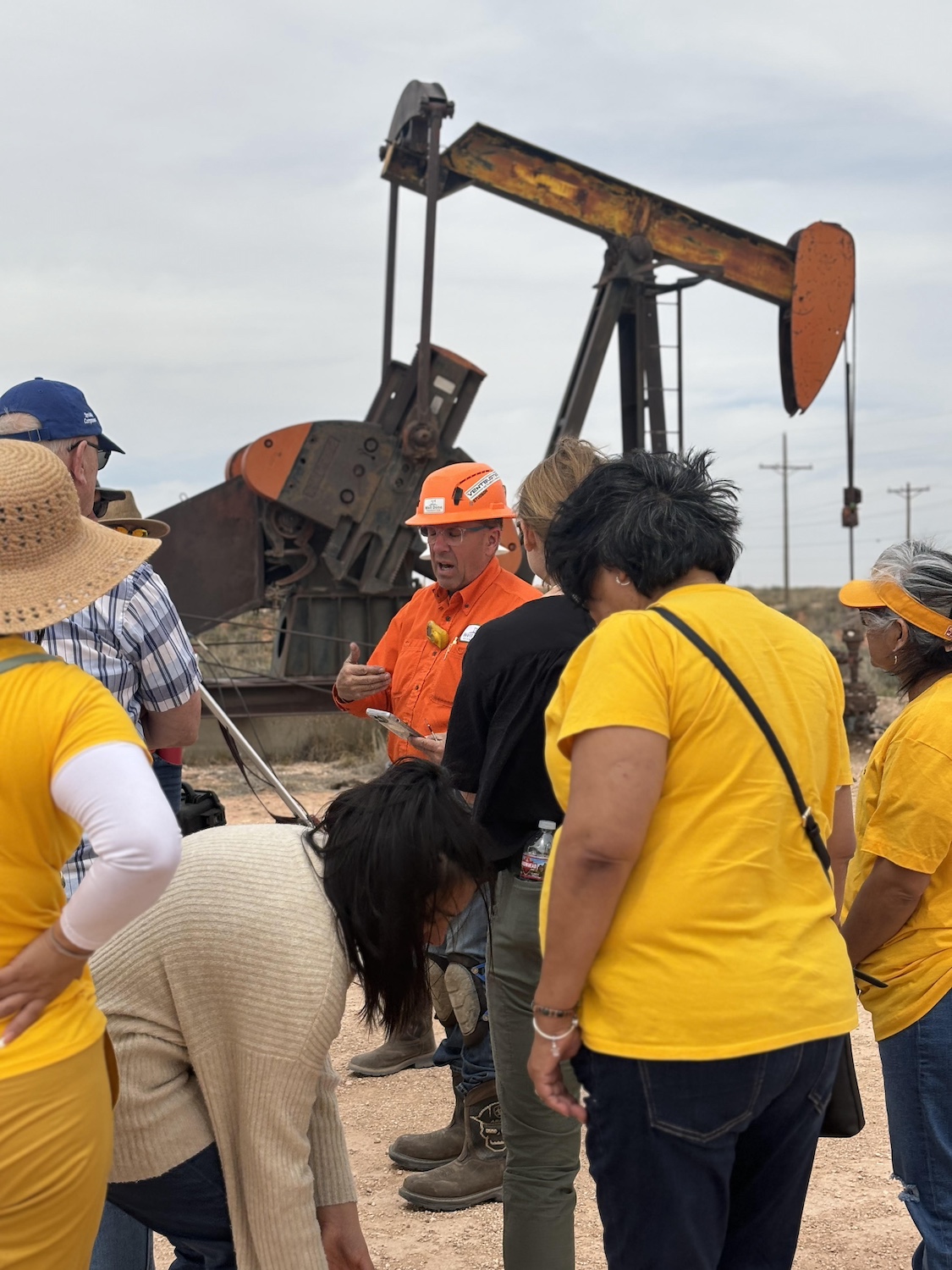
Increasing voter turnout is a major goal
While many residents in Rodriguez’s region are not eligible to vote due to their citizenship status, those who are eligible are often unaware of the difference they can make. “That's where we come in,” he said. “We're educating our community, basically, and having them go out and vote and making their voice heard.”
The organization had a good turnout in the last election and helped Gabe Vasquez be elected to the U.S. House of Representatives, serving New Mexico's second congressional district in the southern half of the state, Rodriguez said.
“We did see that change,” he said. “We saw that people went out and voted, and we're very happy with it. This year, we're going to be doing the same thing, and going out and getting people to vote.That's really important because if we want change, our members are going to be that change.”
Increasing voter participation is also integral to attracting candidates who represent the people instead of the oil and gas industry. There haven’t been many such candidates on the ballot, leaving oil and gas families with limited electoral options and, consequently, limited power, Rodriguez said. He’s hopeful this will turn around as more of the workforce gets out to vote.
Although oil and gas families make up the majority of the population in southeastern New Mexico, their mixed status means they are less represented in the local electorate. While Somos is increasing voter turnout among citizens, the fact that many residents in the Permian Basin are ineligible to vote is a major limitation.
The organization works to change this by assisting immigrants in attaining citizenship through its Citizenship Now program, which is currently assisting 51 participants with the necessary paperwork. So far, 282 immigrants became U.S. citizens through the program. It is a slow process that won’t change the outcome of elections right away, but it drastically changes outcomes for those who are able to successfully complete the process.
Just Futures Offers Sustainable 401(k) Options for Nonprofit Workers
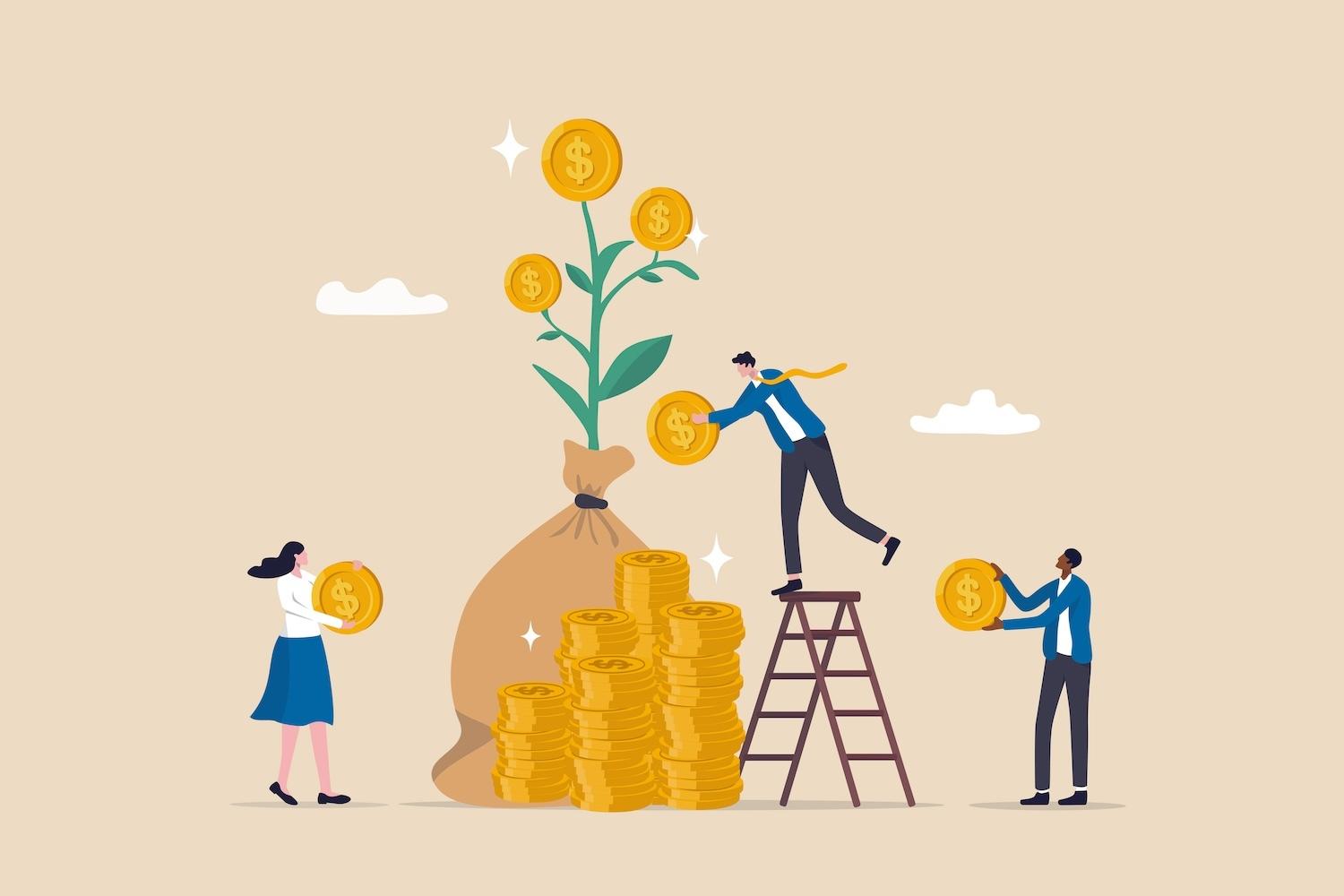

(Image: Nuthawut/Adobe Stock)
Nonprofit workers dedicate their lives to making the world a better place. But once they retire, they rely on 401(k) plans that are generally terrible for the planet.
Most companies invest the money put into these funds in assets like gas, oil and coal. Often, nonprofit workers looking for reliable retirement plans don’t have sustainable and ethical options. If they want to retire, they have to rely on unethical and planet-destroying investments, a steep cost for survival in retirement when you’ve spent your life working to address the issues those investments caused.
This is the problem Just Futures, a platform that connects nonprofits and their workers with conscientious investment, seeks to address. Founded by movement activists, nonprofit workers and volunteers, Just Futures offers nonprofit organizations alternative options to the retirement plans that actively harm the planet and those living on it. The organization just ran its first pilot program with nearly a dozen nonprofit organizations across the country.
“When we come into new organizations, they’re like: ‘Where have you been? We've been looking for you,’” George Guerrero, CEO of Just Futures, told TriplePundit. “That's the sort of feedback that makes it really gratifying.”
Just Futures screens companies for complicity in climate change, the prison industrial complex and immigrant detention, weapons manufacturing, employment discrimination, union busting, predatory and discriminatory lending, the promotion of hate speech, and asset managers that voted against shareholder resolutions that support racial justice. The organization also scores companies on whether the investment will provide good returns for their clients.
“We have the notion that elements that are specific to climate are fundamentally rooted in social justice issues and social equality issues that resonate within other parts of society,” Guerrero said. “They're all interconnected. People and the planet are inexorably tied together, so impact on climate has an impact on people, and vice versa. All of those elements are factored into how we think about the investment solutions that we build for our clients.”
The elephant in the room is the question of whether investment — or capitalism itself — can truly be ethical. For many social justice activists, capitalism is the root of social issues that can only be solved through an equitable redistribution of resources that capitalism does not allow. Just Future recognizes this tension and doesn’t pretend it’s not an issue, Guerrero said.
“We are an investment organization. We’re investing people's money. Those dollars go into public trading companies — it’s capitalism,” Guerrero said. “So, there's a fundamental contradiction in how some people think about all these elements, and we're open and upfront with our clients about that. It's about the emphasis on fiduciary-first and how values can layer into that responsibility. But I wanted to name that because we're not putting ourselves out there as an idealized, 100 percent [ethical] solution. That doesn't exist because you're always going to have that tension.”
The interconnectedness of social justice issues means that war profiteering is recognized as a huge source of planet-warming emissions, for example.
“The weapon industry is something we screen for and that we are cognizant of,” Guerrero said. “It is a sector we de-emphasize, and we can point to a rationale relative to risk management [because of] the volatility of companies that are involved in that type of business. This is part of that tension that I was referring to.”
Part of Just Futures’ mission is the concept of a just transition, a framework that seeks to guarantee that the global transition to a net-zero economy is fair and inclusive to all workers, communities and social groups.
“It’s about moving from an effectively extractive system, an extractive economy that we live in, to one that's more restorative, cooperative,” Guerrero said. ”It's not going to happen overnight, this kind of change. It's not a light switch. It's more of a dimmer …where the illumination that's required to signal that change happens over the course of decades. It's probably not going to happen in my lifetime. But we hope that Just Futures is just one of many agents of change.”
Should Employers Prepare For a Summer of Protests?
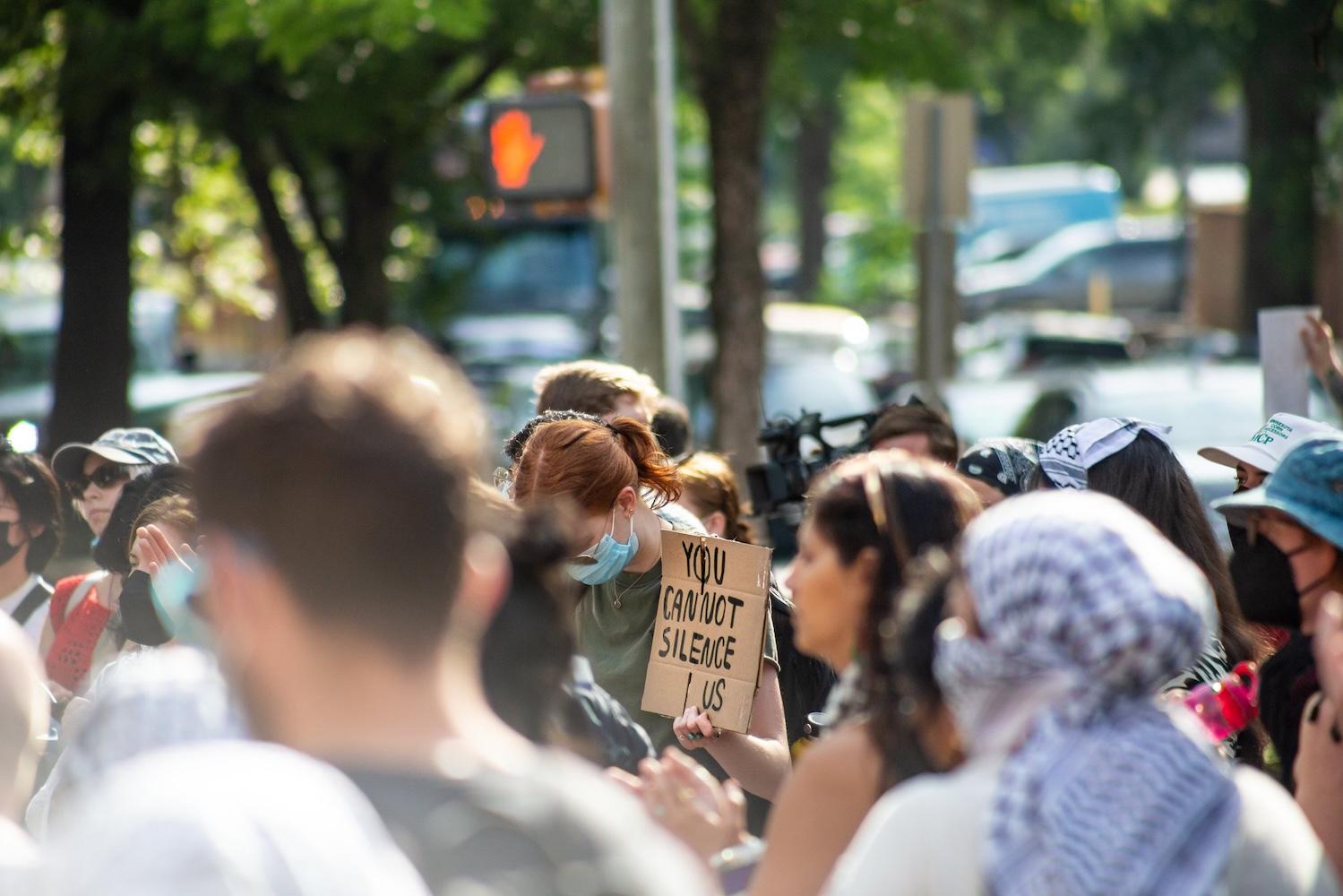

Student protestors gather outside the University of North Carolina at Chapel Hill on May 3, three days after campus administration sent police in to break up a prior protest encampment. (Image: Jillian Kern/Flickr)
Summer jobs and student internships have been rites of passage for generations. But this summer could pose unique challenges for employers as some analysts anticipate the string of protests at colleges and universities will spread to office buildings and corporate campuses.
Google insists on a protest-free zone
The events of October 7, 2023, in Israel and the aftermath in Gaza have been widely reported, as have the protests on college and university campuses in the U.S. The protests resulted in more than 2,200 arrests across at least 40 locations since April 18 alone, according to news reports.
Due to the number of campuses involved, it is reasonable to assume that many summer job seekers, interns, and graduates in search of permanent employment have been exposed to organized protests as well as individual actions at their schools and elsewhere. Depending on the school’s public or private status, many of these students are also accustomed to an environment in which the right to protest is protected, respected, and supported by their peers and teachers.
Of course, the First Amendment does not apply to private workplaces, though labor laws may afford some redress against retaliation. That fact was on full display last month when dozens of Google employees were fired shortly after participating in two sit-in protests at the company's offices on April 16.
C. Taylor Jr., president and CEO of the trade association SHRM (formerly the Society for Human Resource Management), told CNN he expects further workplace protests to be limited, “because of how swiftly and unapologetically Google addressed it."
That viewpoint is consistent with a staff memo attributed to Google CEO Sundar Pichai. As cited by CNN on May 1, the memo urged “staffers to keep ‘politics’ out of the workplace.”
“Pichai told workers that ‘this is a business, and not a place to act in a way that disrupts coworkers.’ Pichai went on to urge Googlers to not ‘fight over disruptive issues or debate politics’ in the workplace,” CNN reported.
Warning signs for Pride Month
Even if simplistic exhortations about workplace behavior are effective within the office walls, outside activity is a gray area. Business leaders will need to be mindful as the U.S. marks LGBTQ+ Pride Month in June as the display of national flags and symbols at Pride events is already a matter of contention going back years.
“The Israeli-Palestinian conflict — ostensibly not about LGBTQ issues and thousands of miles from the U.S. — has become a potent flashpoint within the queer community,” NBC reporter Avichai Scher observed back in 2019 amidst tensions around the Israeli flag being displayed at some Pride events.
Though other observers have drawn a more direct overlay with LGBTQ+ issues, a look back at Scher’s reporting mirrors the complicated landscape of Pride Month 2024.
When workers organize to protest issues such as climate change, sexual harassment or the treatment of migrant children, circumstances of personal identity and national heritage are not generally the focus of attention. In the current protests, personal identity and national heritage are entirely front and center.
To further complicate matters, Pride Month has also become the focus of right-wing attacks, a phenomenon linked to the failed insurrection of January 6, 2021, and supported by a wave of anti-LGBTQ+ legislation in many U.S. states. Signs of another layer of risk appeared last week when a Black female student protestor at the University of Mississippi suffered racially charged taunts from a large crowd of counter-protestors that was mostly white and male. U.S. flags and flags supporting former President Donald Trump were on display.
In another widely reported incident, a protest group on the campus of the University of California, Los Angeles, was physically attacked in the early morning hours of April 30. As of this writing, the instigators of that attack are unidentified.
In addition, reports of harassment and unsafe environments on campuses have raised concerns over personal safety for many students, regardless of whether or not they are part of an organized protest.
Communication is the key
Against this backdrop of contention on campuses across the U.S., employers need to communicate with their employees about the potential for Pride Month activities to be disrupted by hate speech, harassing behavior or outright violence.
The risk management organization United Educators provides guidance for campus administrators that can also be helpful for businesses: “Activism-fueled demonstrations by campus community members at colleges and universities are a perennial risk,” the organization notes in an online guidance. It advises taking common sense steps, such as making sure that policies are communicated clearly and in detail.
The organization also suggests that response plans should be rehearsed in coordination with other stakeholders. In terms of businesses, that would include employee groups as well as a DEI (diversity, equity and inclusion) officer or other personnel liaison, in addition to security and communications personnel.
The importance of situational awareness
Employers also need to find a space for communicating with their employees about risk at public events, rather than focusing solely on expectations for their personal behavior.
Pedro Noguera, dean of the Rossier School of Education at the University of Southern California, shared his experienced perspective with Ayesha Rascoe of National Public Radio last week. Noguera was among the leaders of the 1980s anti-apartheid activist movement while student body president at the University of California, Berkeley.
In particular, he said the movement to push universities to divest from South Africa was successful because it was nonviolent and leaned into educating students and faculty about the apartheid system. "We did a lot of education work, we did teach ins, and that really helped because many people didn't understand South Africa, didn't understand what divestment was about," Noguera said. "[University administration] weren't happy about what we were doing, but we tried to assure them that this was not about destroying the university or tearing it down. This was about making the point politically."
Though accusations regarding the involvement of “outside agitators” have been a feature of protest movements for generations, Noguera cautioned today’s protestors to be vigilant about protecting the integrity and mission of their movement.
“My advice [to protestors] is always be careful about who you're out there with," he said. "There are elements out there who are agitators, who are provocative. You got to really be careful because they will divert the message to be the destruction of property and violence, away from the focus of the protest."
In the end, there is only so much preparing and guidance can accomplish, and employers may have to view the way they navigate emerging protests through the lens of a learning experience. The lesson taught by Google — that a business leader’s job begins and ends at the office door — is clearly out of date.
Inside TelevisaUnivision's Media Blitz to Drive Voter Registration
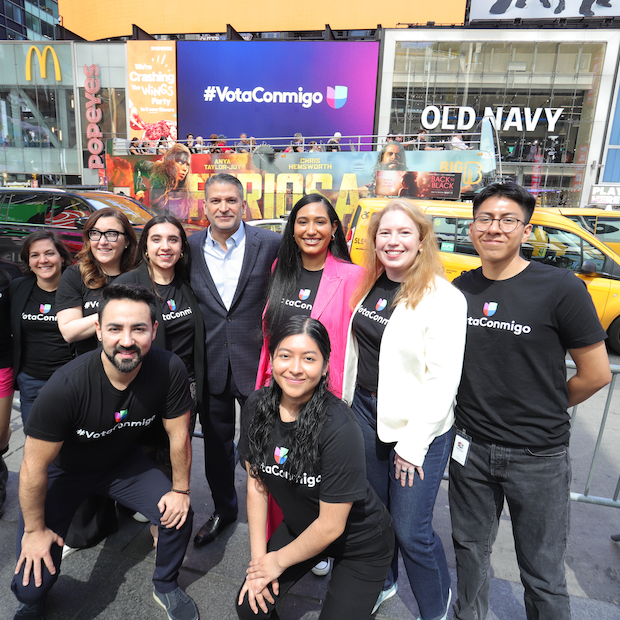
The TelevisaUnivision team at the first Vota Conmigo event of 2024, held in New York City's Times Square last week. (Image courtesy of TelevisaUnivision)
Newscasters and on-air personalities lined the sidewalks of Times Square in New York City last week, broadcasting live to television, radio and digital audiences about the 2024 U.S. elections. Campaigners in matching T-shirts offered to help passersby register to vote and sign up for election updates. Overhead, billboards lit up with messaging for Vota Conmigo, a voter education campaign from the Mexican-American media company TelevisaUnivision and partners across the United States.
Spanish for "Vote With Me," the Vota Conmigo campaign focuses on providing essential election information to Hispanic and Latino voters. The nonpartisan campaign reached 770 million media impressions and registered 1.3 million new voters ahead of the 2020 election.
"It was a great success story," Teri Arvesu, SVP of social impact and sustainability at TelevisaUnivision, said of the 2020 effort. "That becomes the new benchmark — we have to get bigger and better from there."
Civic engagement groups predict about 17.5 million Hispanic and Latino voters will cast a ballot in the November elections, a 6.5 percent increase over 2020. With voter registration through Vota Conmigo, TelevisaUnivision and its partners aim to increase Latino participation even further to 20 million at the polls.
"This is about democracy," Arvesu said. "It doesn't matter who you vote for, I don't care. It's about showing up. And that means something fundamentally much deeper for our community when so many of our families came here from countries where they would not have been able to exercise that right to vote or to participate in a democratic society."
Breaking down barriers to voter registration in Hispanic and Latino communities
Though they're a powerful voting bloc in the U.S., Hispanic and Latino Americans are less likely to be registered to vote compared to white Americans. A number of factors contribute to this, including a lack of voter education materials in Spanish and apprehension among new citizens about voting processes or their eligibility to vote. "Our community doesn't want to make a mistake," Arvesu explained. "Rather than making a mistake, they might prefer not to act."
The Vota Conmigo campaign aims to break down some of these barriers and ensure more eligible Hispanic and Latino voters have their voices heard at the polls.
"Compared to English, there's not enough [Spanish-language] content on voter education. There are fewer media companies in Spanish," Arvesu said. "Univision will always and has always filled that void for our community to the best of our ability."
Univision is the largest Spanish-language media network in the United States for more than 30 years running, reaching millions of viewers annually with news broadcasts, sports, scripted series, telenovelas and other entertainment programming. It also serves local programs to 17 regional markets across the U.S.
"The relationship of our audience to our brand goes so much further beyond the relationship that other communities may have with the English-language equivalent," Arvesu explained. "I’m a 200 percenter — 100 percent Hispanic and 100 percent American — and I have not found the equivalent of this in my American life. It is a phenomenon that exists in Spanish-language and through the immigrant experience. It is something emotional, it is nostalgic, and it's a lifeline."
Because there are fewer trusted sources of election information in Spanish, Hispanic and Latino voters are often targeted with disinformation campaigns aimed at misleading them about their eligibility or even basic information like the date of Election Day and the time polls are open.
Vota Conmigo leverages the brand's trusted relationship with audiences to provide essential election information like voter registration deadlines, vote-by-mail options and how to find local polling places, providing a powerful counter to disinformation efforts and drive voter registration.
"The way our community figures out if something is mis- or dis-information is to turn on Univision to see if they're talking about it," Arvesu said. "We need to make this something that is demystified. We are building the confidence of our community to participate. They're not going to make a mistake. And the more we can illustrate that in walking them through the process, giving them the tools to be able to build that confidence, we have found that tends to have higher conversion rates at the polls."
The network also enlists its reach and marketing might for omni-channel takeovers for Vota Conmigo, with segments integrated into everything from news broadcasts to sports, animated shows and the network's iconic entertainment hits like "El Gordo y La Flaca."
"It feels like it's in brand," Arvesu said. "It's meeting the viewer where they are to get them interested, and then get them to consume the educational content and tools we've created."
Times Square event kicks off Tuesdays of action until Election Day
The Times Square splash marked the first 2024 iteration of Martes de Acción (Action Tuesday) when every television, radio, digital and social media property across the TelevisaUnivision network features content related to voter registration and Vota Conmigo. The days of action will continue monthly through Election Day, with weeklong takeovers in September and October for National Voter Registration Day and Vote Early Day.
The event last week featured prominent television personalities including news broadcaster Borja Voces, who recently became a U.S. citizen and will vote for the first time in 2024. A video series called "Mi Primera Vez" ("My First Time") also features on-air mainstays like newscaster Maity Interiano and presenter Roberto Hernández reflecting on what it means to cast their first ballots.
"All our talent gets super excited," Arvesu said. "Then they start sharing it, and it's all over the place. That's how you see it come to life."
Enlisting partners and ambassadors to drive voter registration
While Univision's reach is large, it doesn't include every eligible Latino voter. Latino and Hispanic voters are more likely than white voters to get their political information from word-of-mouth sources like social media, and those who primarily rely on social media for this material tend to be less informed and engaged around politics.
To go beyond its own sphere of influence, Vota Conmigo aims to enlist viewers as ambassadors for accurate election information through their social media channels and in conversations with friends and family. "No matter how big your digital footprint is as an individual, each of us are micro-influencers," Arvesu said.
The campaign also engages TelevisaUnivision employees working in front of and behind the camera. "We need to make sure our employees are highly, highly educated in the topic so we can deliver on the promise to our community to get the best, most accurate content," Arvesu said. "You have to start at home with everything, so we are starting at home. In our campaign, we work with all parts of the company. It is truly an enterprise-wide cause and commitment."
And it doesn't stop at Univision. The Vota Conmigo campaign also includes Latino civic and nonprofit organization like Mi Familia en Acción, The Libre Institute, NALEO and Poder LatinX. For the first time in 2024, other Spanish-language and bilingual media companies are also getting involved.
The Hispanic Get Out the Vote Coalition — which includes TelevisaUnivision, the National Association of Broadcasters and media companies like Telemundo — aims to bring the reach of Spanish-language and bilingual media together behind voter registration. The coalition and Vota Conmigo are still accepting new partners in the ramp-up to November, and Arvesu is encouraged that the engagement they've seen so far will result in record turnout for Latino voters in November.
"I’ve been in the business for quite a bit of time and I don’t think I have ever seen that level of unity amongst the media companies," Arvesu said. "It's going to be a little hard to ignore this community in this election when you see the way these communities are collaborating and working together. There is strength in numbers, even if we have different opinions politically, and I hope people are taking note of it."
Can Young People's Faith in Democracy Be Restored?
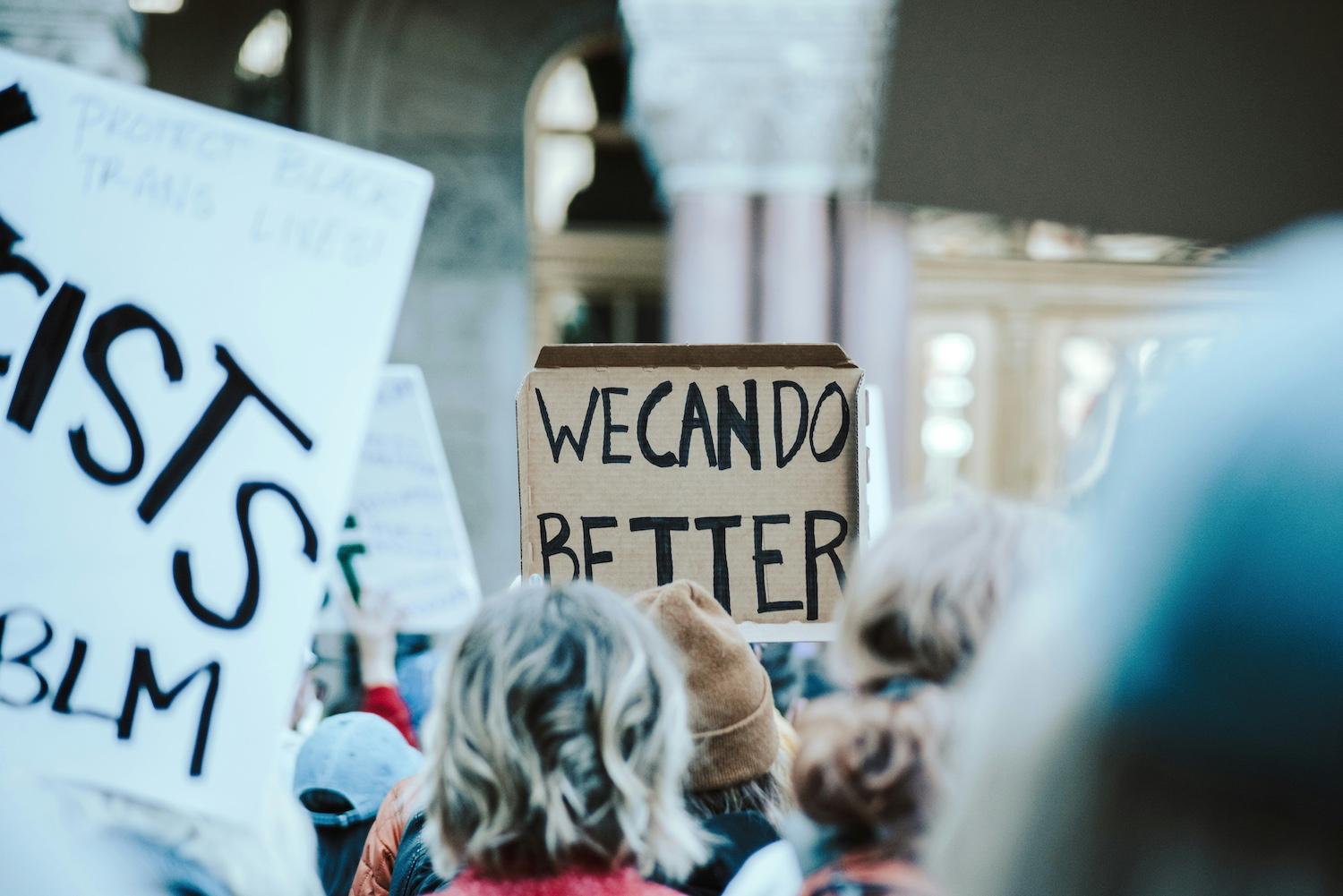
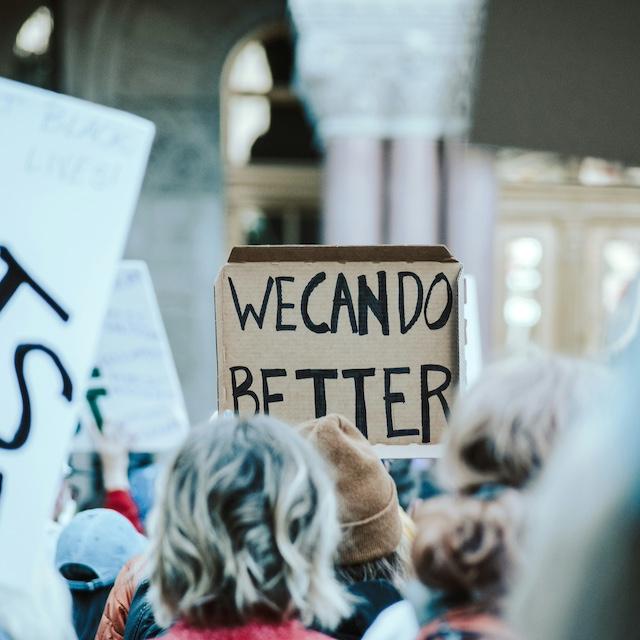
(Image: Sandra Seitamaa/Unsplash)
If you were told that over half of young people in the United Kingdom would prefer to live under a dictatorship, what year would you say this data was drawn from?
It might shock you to learn that the survey was conducted in 2022 rather than 1922.
This is the extent to which frustration has harbored among many young people who have grown disenfranchised with democracy. Those who see only a widening disconnect between the priorities of current leaders and their own.
Young people are increasingly viewing the efforts of global leaders as incapable of turning the dial on the issues that mean the most to them, notably the climate crisis, economic insecurity, mental wellbeing and social inequality.
This is a generation set to inherit a world where climate change nears a point of no return, where inequality is skyrocketing and mental health plummeting globally. Inaction — or at least insufficient action — is driving a cohort of voters away from democracy.
With almost half of the world's population voting in 2024, how can we restore faith in a system that has failed young people and their concerns?
Better engagement with the issues that mean the most to young people
Young people are often overlooked in political processes. For example, 60 percent of Africa’s population is aged under 25, but the median age of its leaders is 62, according to the nonpartisan research nonprofit the Brookings Institution. If politicians want young people to engage, they need to engage with the issues that matter to them.
Young people are particularly invested in social inequality and climate change, with 51 percent of those polled by the global community for young leaders One Young World saying that climate anxiety was negatively affecting their mental health and 55 percent saying that they had no confidence in those leaders to deliver net zero by 2050. When we look at the polling numbers for incumbent leaders, it becomes clear that current politicians are not addressing these issues effectively, if at all.
This is evident in the United States, where President Joe Biden’s approval ratings have dropped significantly amongst young voters primarily due to his stances on issues important to them — namely inaction over student debt and climate change. Young people globally are growing increasingly impatient with global leaders and their inability to turn the dial on such issues.
Take for instance the response to the Grenfell Tower fire. Just last month we were told that the final report of the tragedy was further delayed and wouldn't be published until after the seventh anniversary of the disaster. Now compare it to Russia’s swift response to the mall fire that killed 64 people in Kemerovo, where managers faced charges just days after the blaze. Russian authorities face accusations of corruption and misleading the public, but where there is public anger, there is a lack of patience with institutions and a disregard for due process.
And with this atmosphere of public anger and impatience, the false promise of the autocrat becomes an ever present threat: That strong-man leaders move decisively, whilst the focused deliberation of democracies is inherently slow.
If incumbent leaders wish to engage young people, they need to listen to their concerns and commit to tangible action, and they need to move faster. Young people’s priorities, such as housing and climate change, cannot afford more decades of inaction.
Empower the next generation of young leaders to secure democracy
Whilst those currently in power need to listen to the concerns of young people, the security of democracy depends upon the next generation of leadership. It is imperative that we cultivate strong, ethical and self-aware leaders that are equipped to face the challenges of rising authoritarianism.
Part of that process must be empowering young people to play a more central role in decision making, allowing them to address the concerns of their peers and introducing new perspectives into traditional institutions.
In order to make lasting change, youth voices need to be included for policies to respond to the specific needs of younger generations, according to the Electoral Knowledge Network.
In many parts of the world we have seen a hopeful start to this trend. From France electing their youngest prime minister, Gabriel Attal, at age 35, to Ireland’s new taoiseach, Simon Harris, aged 37.
We must give recognition where recognition is due. That’s why in 2018 we created the One Young World Politician of the Year Award. It is the first global award to recognize the most promising young politicians between the ages of 18 and 35 from around the world using public office to effect positive change in their communities, particularly to benefit and represent young people. The 2023 winners included: Arielle Kayabaga, member of parliament for London West, Canada; Moko Tepania, mayor of the Far North District, New Zealand; Sobita Gautam, member of the House of Representatives, Nepal; and Ayor Makur Chuot, member of the 41st Parliament of Western Australia.
But leadership is not just about politics, and young people should be trusted in other spheres of influence as well. From business and community leaders to innovators, young people have shown that they have a vested interest in tangible solutions, and we must enthusiastically empower their endeavors.
In order for young people to have trust in democracy we must trust them, by inviting them to the table, platforming their voices and investing financially in their ideas.
Create forums for collaboration
As the world becomes increasingly more polarized, and young people continue to become more skeptical and more detached from society, the importance of creating community is clearer than ever. We face some of our most global and existential challenges, from climate change to rampant inequality. If we are to effectively tackle these issues, we must work together.
Investing in spaces for like-minded individuals to come together and work towards common goals is crucial. Each year at the One Young World Summit, I see the tangible progress that grows from conversations and connections at the event. International forums for collaboration act as a key means to engage and inspire younger generations, empowering them to find an active role in the betterment of society.
But beyond this, these forums create the space to bridge divides and debate contrasting opinions.
Listening to and understanding contrasting perspectives, and even criticism, can open up your world view and allow you to strengthen your resolve and mission. Understanding why people are resistant to the change you are proposing allows you to adapt your proposition and give your cause a better chance at acceptance. As One Young World Counselor, Thuli Madonsela, who helped draft the South African constitution, says, “seeking first to understand the world view and concerns of those who disagree provides a basis for establishing some common ground."
While there might be a crisis of faith in democracy, it is clear as to why. Young people feel as though they do not have a seat at the table and are powerless to make change. Our current leaders must do more to engage on the issues that matter most to young people and ultimately we must empower and champion our young leaders to take on leading public roles. Collaborative forums where young people can engage with current global leadership as well as like-minded individuals is essential to inspire the next generation of change makers.
It’s also important to recognize that young people are already changing the world and making steps towards a fairer and more sustainable future. If we truly want to dispel the false promise of the autocrat and restore faith in democracy, we must trust young people to do this not just "tomorrow," but now.
On the Move: How Avocado Exports Work
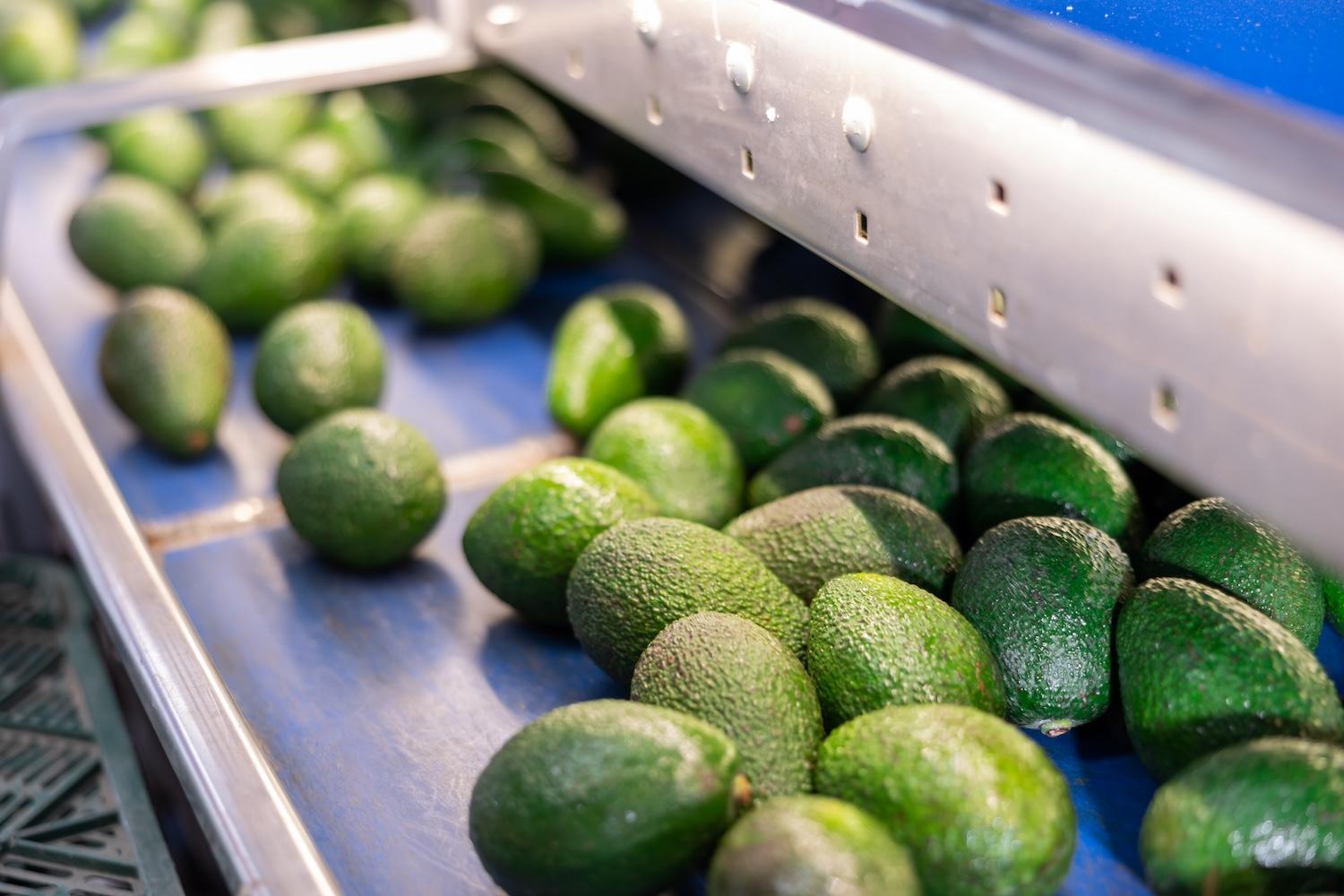
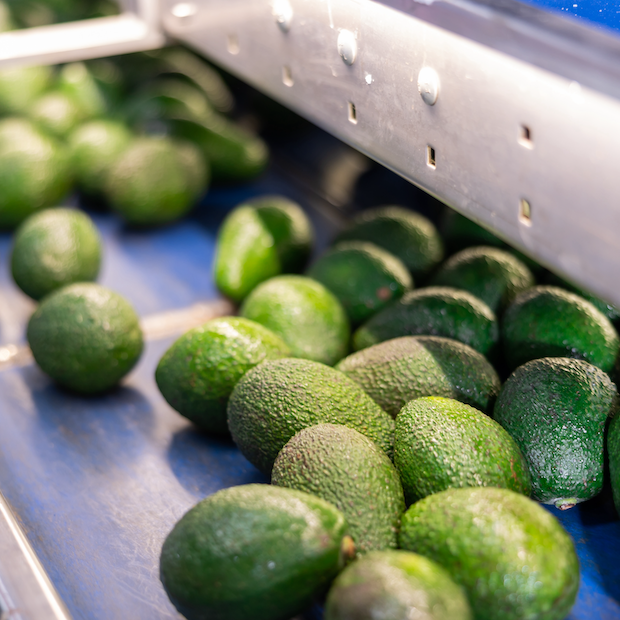
(Image: JackF/Adobe Stock)
The growing popularity of avocados in the United States has created an economic boom across all parts of the fruit's value chain. In fact, imports of Mexican avocados added over $6 billion in gross domestic product to the U.S. economy in 2022 alone, according to a recent report. The avocado industry in Mexico also supports approximately 78,000 direct and permanent jobs and more than 300,000 indirect and seasonal jobs.
While farm workers play a crucial role in the avocado's journey from orchard to table, thousands of buyers, packers, marketers and logistics professionals are just as critical to the industry’s growing success.
The farm-to-table journey
For Ricardo Vega, avocados are a piece of home. He comes from a family of avocado growers in Michoacán, Mexico, the center of global avocado production. His father started one of the first commercial avocado orchards in Michoacán in the 1960s, complete with a packing house and distribution center.
Vega followed in his father’s footsteps and built a thriving distribution center in the heart of the world’s largest avocado growing region. “I am fortunate,” Vega said. “The vast majority of avocado growers don’t get to see where their product goes after the packing house. For me, it is amazing to see the products we grow go from the orchard all the way to the stores and to the consumers.”
The journey starts in Michoacán’s orchards. “We have a team of buyers who visit orchards to select the fruit with the best quality,” Vega explained. After the buyers make their picks—all while the avocados are still on trees—a picking crew harvests each batch and transfers them to the packing house.
“We work hard to avoid waste from the moment of harvest,” Vega continued. “You cannot export fruit that touches the ground, because there is the risk of dents and contamination. We process 500 tons of avocados per week. If even 5 percent of that fruit touched the ground, we could be wasting [approximately] $30,000 of avocados.”
Once the avocados arrive at the packing house, they are cleaned, disinfected and inspected by United States Department of Agriculture (USDA) officials. The avocados are then graded by size and quality before being stored in a cold, climate-controlled space. There, they await transport and distribution. “Everything is selected and packed by hand,” Vega said. “It’s an artisanal process.”
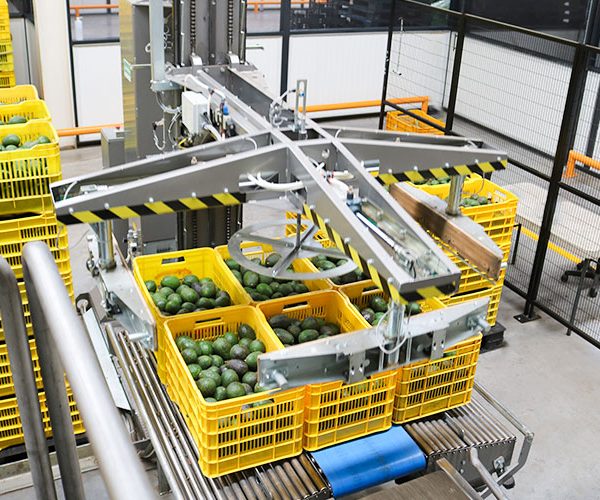
Growing healthy avocados for a healthy planet
Improving operational sustainability is critical for all parts of the avocado industry’s supply chain. Vega’s company has implemented several sustainable practices, such as using recycled packaging and disinfecting produce with UV lights to reduce water use. His packing house is also zero-emissions and utilizes solar arrays and energy-efficient equipment, Vega said. “We know we have to keep working on issues such as forest management, water and climate change so we can keep growing avocados sustainably in the long run,” Vega shared.
Food loss and waste accounts for approximately 6 percent of total greenhouse gas emissions globally, which is why finding innovative solutions is key for any company in the food sector. “Each company has its own strategies to avoid waste,” Vega explained. “However, we have implemented a very strict process of controls from the orchard to the transportation to avoid loss.” While there is some food loss in the packing house, his team utilizes the waste to make compost for the orchards and avocado oil for the beauty industry, he said.
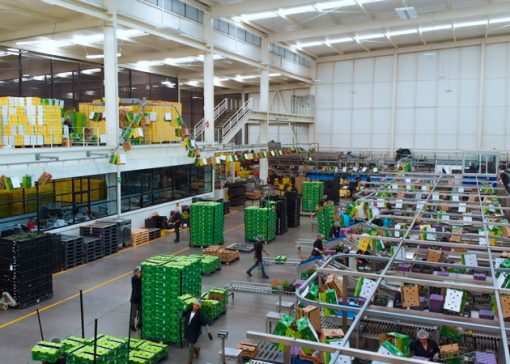
Community impact
Vega counts the continued development of the avocado industry and the growth of both his company and community as his most important measures of success. “Twenty-five years ago, the price for 1 kilo of avocados was 15 cents. Now, it is $1.50 to $2. This has grown our community life in a way that can’t be quantified,” he said.
The economic boom has allowed Vega to invest in his employees and the broader community. That includes providing benefits for employees who stay with the company over the long-term. When employees have been with the company for more than eight years, they are eligible to participate in a program that covers the costs of home improvements. The company also provides scholarships to elementary and middle-school students, as well as supports a home for senior citizens.
“Since Michoacán has been able to export avocados to the world, it has drastically changed the quality of life in Michoacán and in avocado-growing communities,” Vega said. He noted that 25 years ago, Michoacán was one of the top three Mexican states sending migrants to the U.S., but job opportunities and an increasing quality of life has allowed residents to stay.
“People have opportunities now in the avocado industry. They don’t migrate for work in other places. It is noticeable in our community, and in our quality of life, even if it is not measurable.”
While Vega followed his father into the avocado sector, he is now passing his love for the business to his son. “I have been in this line of work since it started, and now my son is a part of the family business as the third generation of avocado growers and packers in our family,” Vega reflected. “For us, in this industry, every day is different, but that’s what makes it fun.”
This article series is sponsored by the Avocado Institute of Mexico and produced by the TriplePundit editorial team.
Donte West’s Growing Cannabis Coalition is Fighting for Reparative Justice
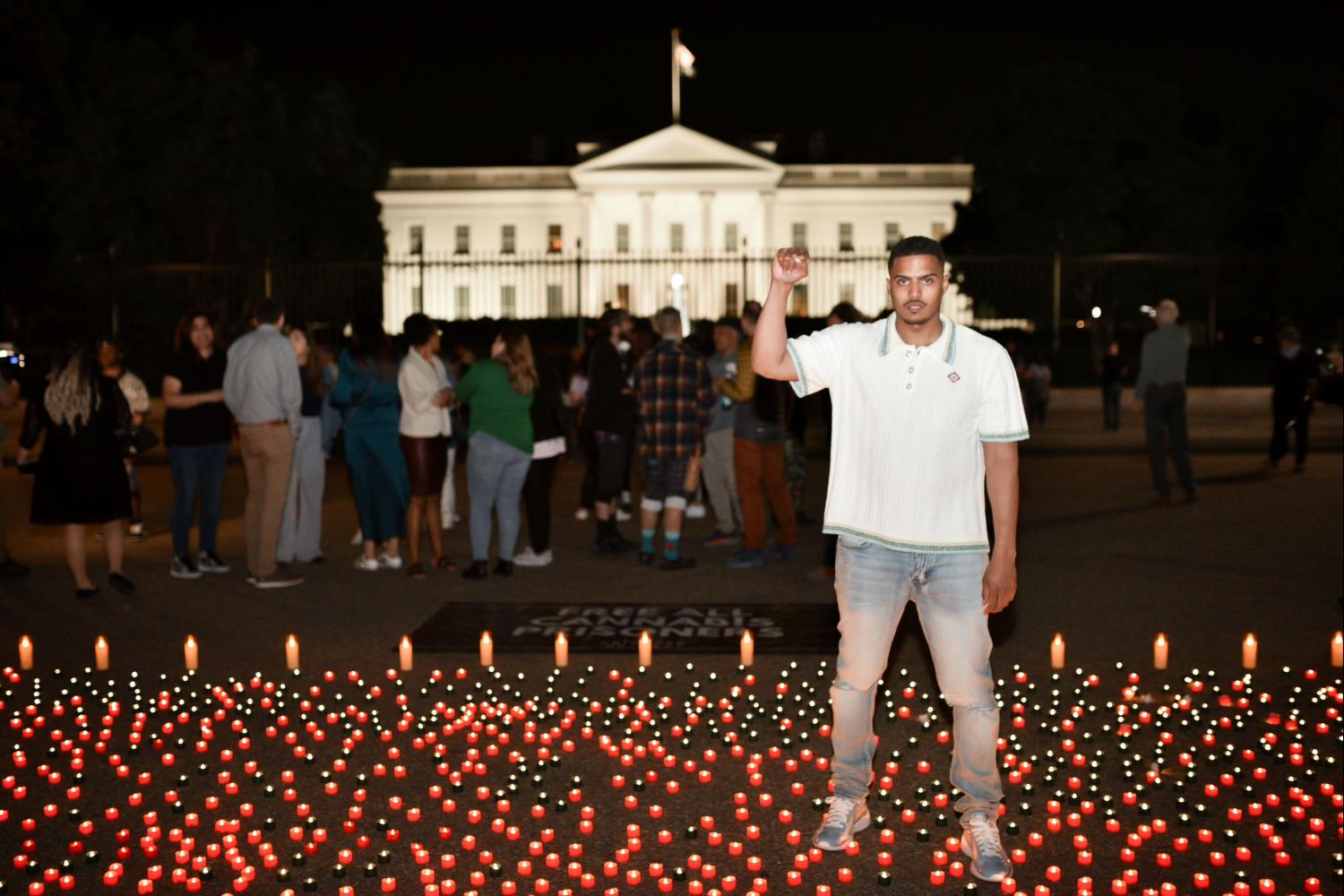
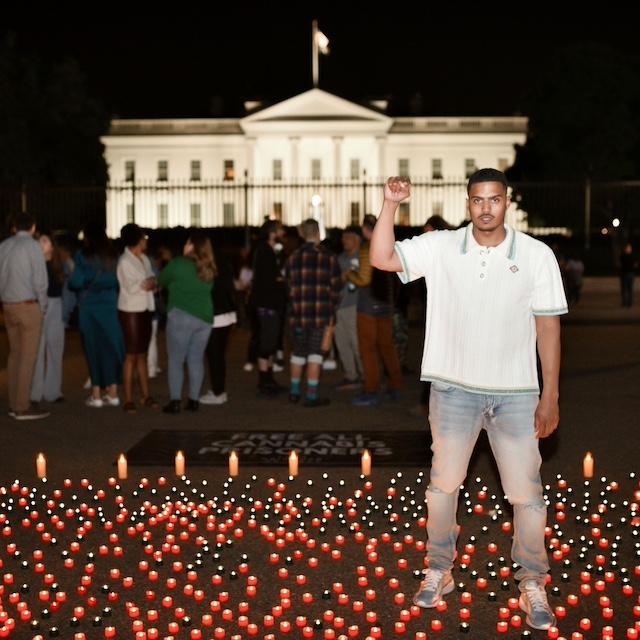
Donte West advocating for cannabis clemency and decriminalization with Last Prisoner Project in Washington D.C. (Image courtesy of the Last Prisoner Project)
In the first issue of Frederick Douglass’s groundbreaking newspaper, The North Star, the scholastic abolitionist declared that “the man who has suffered the wrong is the man to demand redress.”
Donte West is continuing Douglass’ legacy today, advocating for the release of prisoners incarcerated for cannabis-related charges. West earned recognition for sharing the story of his wrongful incarceration in 2017 for false felony cannabis charges. West, the full-time caregiver for his grandmother and younger brothers in California, was severed from his family after a road trip to visit a friend in Kansas led to local authorities falsely accusing him of trying to sell a pound of marijuana.
The Kansas Highway Patrol utilized its now-infamous “Kansas two-step” maneuver — a predatory approach that a federal judge has since declared unconstitutional — to pull West over for “dirt on his license plate.” The long-running tactic violated the Fourth Amendment rights of drivers, particularly those from outside of the state. Putting the cart before the horse, Kansas authorities detained first and asked questions later. Lacking reasonable suspicion for the initial stop, law enforcement extended the stop long enough to create reasonable suspicion to search the vehicle — a guilty until proven innocent mindset.
After the state of Kansas wrongfully charged West with possession and conspiracy to distribute marijuana, he was sentenced to eight years in Lansing Correctional Facility. The duration seemed excessive to West, even more so when he met violent offenders and murderers with shorter sentences.
When the public defender assigned to West’s case failed to help him challenge the charges, he took matters into his own hands. Haunted by the memory of his brothers crying when he left to fly to Kansas and report to sentencing, West began looking into his case and was shocked to see some glaring issues with the state’s only witness — details that his lawyer overlooked.
“Maybe if my lawyer would have read my case, maybe I wouldn’t be here right now,” West recalled thinking. “I began to read the discovery, I became obsessed with my case. I was … reading thousands of cases, kind of just soaking up the game. There was a lot of stuff I didn’t understand, but eventually, after two and a half years, it began to make sense.”
West filed a writ of habeas corpus which would allow him to appear in court and argue that the state had unconstitutionally incarcerated him. Writing to all 125 state representatives and 40 state senators in Kansas, he gathered support from elected officials while the prison staff helped him learn more about his case and the path to pursuing recourse. Local teachers and even the Kansas City mayor vocally supported West, who eventually achieved exoneration in 2021.

Continuing the fight
After securing his own freedom and returning to California, West didn’t sit idle. He has since dedicated his life to helping others in situations like the one he escaped. Now a spokesperson of the nonprofit the Last Prisoner Project, which fights criminal injustice related to the United States' "War on Drugs," West is focused on advocacy and is pursuing a law degree.
West works toward cannabis decriminalization and anti-incarceration with multiple brands, including doing community outreach for the Missouri-based cannabis company Illicit Gardens. The business doesn’t just distribute legal marijuana, but it also raises awareness about the plight of those still serving lengthy sentences for doing the same thing that other Americans are now building fortunes on, with the legal cannabis market now valued at over $21 billion in the U.S.
In 2023, Illicit Gardens launched the West Brand, raising awareness about the continued injustice of cannabis-related felonies for those now released from prison.
“People that were a felon couldn’t work in the cannabis industry in Missouri,” West said. “If all they knew to do was to sell weed, they wanted to get out and be in the industry and was like, ‘I’m gonna learn it the right way. I’m gonna pay taxes. I’m not gonna jeopardize my freedom.’ You couldn't even do it because you’re a felon.”
Through compelling graphic design on stickers, T-shirts and marijuana containers, West depicts the ongoing injustice of a nation in which some profit off the same thing others are punished for. One cannabis container displays a cartoon of a man on a cloud dangling a fishing rod above a prison. Then, it depicts a prisoner running across the cloud and jumping onto a bus for outbound prisoners.
“Get out, go get one, and go get another one out,” West said. “That’s kind of how the brand does it.”
His T-shirts depict a jail cell with a list of names on each side: On the left are the prisoners West helped to free, and on the right are the prisoners he is working to free. The men he's helped to free include his former bunkmate and current cannabis clemency advocate, Kyle Page, who was able to reunite with his daughter before her graduation thanks to West lobbying the parole board, and Robert Franklin, a Missouri prisoner who served 11 years of a nearly 20-year sentence for possessing a pound of marijuana.
Among the prisoners West is working to free is Kevin O’Brien Allen, who was serving a life sentence in Louisiana for the crime of selling $20 worth of marijuana. West and his coalition of advocates helped reduce Allen’s sentence to 35 years and are continuing to fight for his release.
West modestly describes the number of prisoners he is working to free as “only four or five” at a time, but each person represents a human with family and aspirations, a victim of a now defunct war on cannabis, a soul that may not have anyone else fighting for their release.
“If you don’t humanize these people, you instantly become a number,” West said. “Once you get into the justice system, you’re referred to as a number, and that’s it. How do we prevent that?”
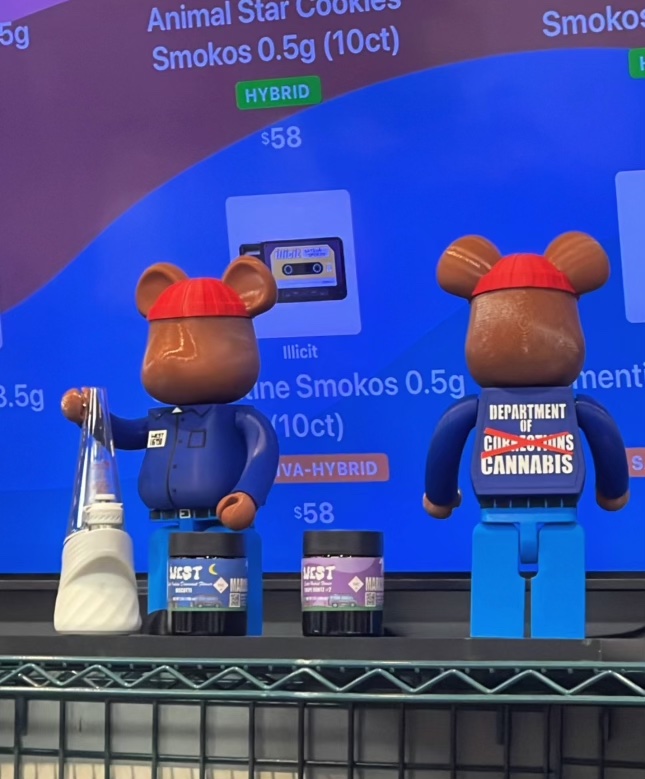
Lobbying for cannabis clemency and decriminalization in Washington and beyond
West’s efforts are focused on states in the Midwest, but he performs a fair share of federal advocacy as well. Ahead of April 20, the unofficial marijuana holiday, West headed to Washington, D.C. with the Last Prisoner Project. The organization put together a massive bipartisan coalition to lobby for cannabis clemency and decriminalization.
The coalition declared April 18 a day of action to pressure the White House and Congress to fully legalize marijuana and grant justice to those currently and formerly incarcerated on cannabis charges.
Members of both parties from both ends of Congress joined the coalition and sought to convince other federal officials to put words into action and achieve cannabis justice once and for all.
While West appreciated the support from members of Congress, he reiterated that for the coalition to reach their shared goal, it is important to connect with and change the minds of those who disagree.
“We’ll never make a change if we’re not a conversation at the dinner table,” West said. “You want to be a conversation piece, because that is how you change the law. It’s a fantastic story with the right policy and legislation attack. It’s like, you gotta inspire me and then bring me the paperwork.”
To that end, West sees the potential of savvy brand marketing to influence change where elected officials have tried and failed.
On top of the marketing and advocacy he performs with Illicit Gardens, West has dipped his toe into modeling and was featured in the clothing company Lucky Brand’s new Last Prisoner Project support campaign. He joked that a judge who put someone away for 20 years on a cannabis charge might think differently when he sees Lucky Brand advocating for decriminalization because he probably owns a pair of the brand’s jeans.
“It shows you how cannabis is going mainstream,” West said. “Hopefully Nike does it next, or Louis Vuitton.”
Through advocacy big and small, West’s influence continues to grow. Kansas City, Missouri, recognized the activist last year by proclaiming April 20 “4/20 Donte West Cannabis Justice Day.”
West’s name now rings out across the Midwest as a tireless voice for the voiceless, be it his old bunkmate in Kansas or a Louisiana prisoner sentenced to life for possessing just two grams of marijuana. For victims of cannabis criminalization in prison and beyond, West is a rising north star.
This Organization Pays Farmers to Grow and Protect Forests in India


The forests of Maharashtra, India, are home to diverse wildlife like this colorful kingfisher, but they are under threat amidst historic deforestation. (Image: Hari K Patibanda/Flickr)
India is facing historic levels of deforestation. The Indian government plans to boost carbon sequestration efforts by increasing forest and tree cover, aiming to pull at least 2.5 billion tons of carbon dioxide from the atmosphere by 2030. The not-for-profit organization Farmers for Forests is helping India achieve those goals by paying farmers to practice agroforestry and cultivate biodiverse forests on historically barren land.
Forests are a critical part of the global fight against climate change. On one side, forest loss and damage is one of the largest contributors to climate change, responsible for about 10 percent of total global warming, according to the World Wildlife Fund. Conversely, smart, biodiverse and regionally-appropriate reforestation contributes to climate resilience and can create carbon sinks that sequester carbon dioxide from the atmosphere.
Farmers for Forests operates in rural areas of India, primarily in the state of Maharashtra, and supports farmers to maintain forests or reforest parts of their land with native species. Using drone technology to track the health of the trees, the organization provides farmers who maintain a certain percentage of tree cover with quarterly cash transfers.
“We leverage technology to ensure that what we have planted survives for the long term because we want to measure the actual outcomes, not just the number of saplings planted,” said Arti Dhar, co-founder of Farmers for Forests.
How it works
Prior to working with farmers in a specific village or region, Farmers for Forests holds informational community meetings and seeks buy-in from local leaders. Then, farmers can speak with the organization’s team members to inquire about enrolling some of their land into the reforestation or forest protection programs.
Farmers for Forests only reforests land that hasn't been used for several years and verifies that the land has been fallow using historical satellite data. It also works with the local land records office to ensure the land ownership is clear and uncontested. Next, the organization creates a contract with a farmer and begins the reforestation process, which includes planting saplings, applying soil inputs, transporting supplies and watering. The team also assists with ongoing care and cultivation.
“Although we have contracts in place, we cannot and do not mandate anything on behalf of the farmer,” Dhar said. “The land and the trees belong to the farmers, and they can do what they want with that. They are the best decision-makers for their circumstances.”
This reforestation process is a form of agroforestry, an agricultural method that integrates trees and shrubs with crops or livestock for environmental and economic benefits.
“In our model, we take land that was barren or fallow and plant agroforests with different kinds of fruit species,” Dhar said. “With fruit sales combined with our payments, farmers on average make three times the amount of money than they would have made from traditional farming. That is why our agroforestry model works. Our global economic system values a dead tree more than a live tree. We need to align incentives with desired outcomes. Our model addresses that.”
The payments are becoming increasingly self-sustaining through revenue generated from the voluntary carbon market. Farmers for Forests aggregates their projects for registry and distributes a percentage of the revenue back to the farmers, creating financial incentives to keep the trees in the ground, rather than harvesting them for wood.
The organization also developed a tech platform that uses drones to monitor the survival rates of several tree species across the areas it serves in India and is preparing to make the platform open source.
“Our technology can detect each tree crown, which is better than what satellites can do,” Dhar said. “Satellite data cannot detect trees until they are about five years old, but trees are most vulnerable in their first few years.”
Sustaining forests for the future
Aside from converting fallow land into agroforests, Farmers for Forests helped keep an additional 3,000 acres of forest protected from deforestation and degradation.
“About 30 percent of India’s land is now considered degraded,” Dhar said. “That is almost three times the size of Germany. That land is possibly emitting carbon instead of storing it. However, agroforestry is climate resilient, improves soil quality and stores carbon in the soil.”
Reforestation goes beyond carbon sequestration and builds climate resilience, which is especially important in rural, agrarian communities who are more vulnerable to the impacts of climate change, she said.
Dhar also emphasized that Farmers for Forests is focused on creating long-lasting change. For each region the organization has forests in, there is a field team living and working there.
“We are focusing on long-surviving sustainability interventions,” she said. “We don’t want to plant and then leave. There are a lot of challenges involved in working in a rural landscape in India, and we want people on the ground actively addressing it.”
Moving forward, Dhar is excited to release Farmers for Forests’ tech platform to other organizations looking to do similar work, but she is also grappling with what scaling up should look like.
“Do we focus on acres of land? Partnerships with other organizations? Or does scale mean fewer acres but higher quality work that stands the test of time?” She said. “There is a lot of greenwashing that can happen with this kind of work, so we want to build an ecosystem of trusted partners and work together on a small level to ultimately reach more people.”